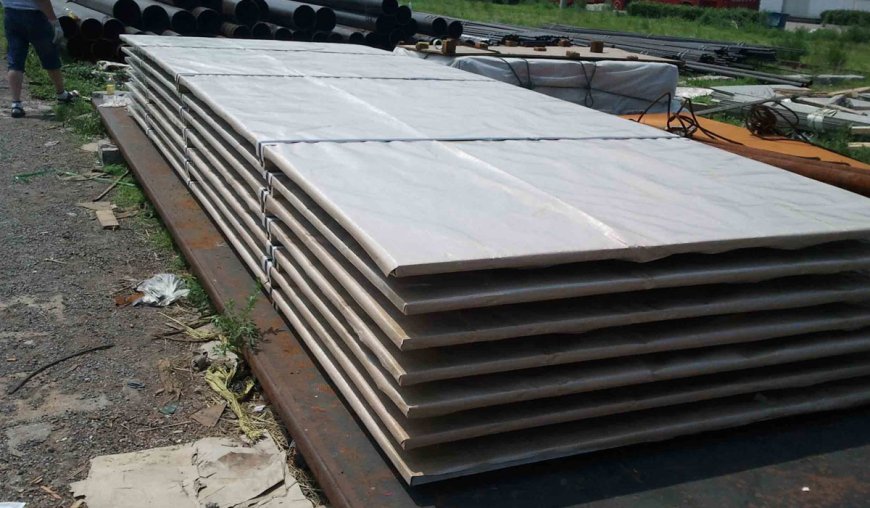Top Benefits of Using Duplex Steel Sheets in Corrosive Environments
Discover the top benefits of using duplex steel sheets in corrosive environments, including enhanced corrosion resistance, high strength, cost-effectiveness, and more. Learn why duplex steel is ideal for challenging industrial applications.

Duplex steel sheets are increasingly becoming a material of choice for industries that operate in highly corrosive environments. Combining the characteristics of both ferritic and austenitic steels, duplex steel offers superior mechanical properties and corrosion resistance. This blog highlights the top benefits of using duplex steel sheets in corrosive environments, emphasizing why they are a preferred solution for many industrial applications.
What is Duplex Steel?
Duplex steel is a stainless steel that has a microstructure consisting of approximately equal parts of ferrite and austenite. This unique structure provides duplex steel with a blend of properties from both types of stainless steel, leading to a highly durable material suitable for demanding environments. The most common grades of duplex steel include Duplex 2205, Duplex 2507, and Super Duplex.
Key Benefits of Duplex Steel Sheets in Corrosive Environments
Enhanced Corrosion Resistance:
Duplex steel sheets excel in resisting corrosion, particularly in chloride-rich environments. The high chromium (around 22-25%) and molybdenum (around 3-5%) content significantly improves resistance to pitting and crevice corrosion. This makes duplex steel an ideal choice for applications exposed to seawater, brine solutions, and aggressive chemicals, ensuring longer service life and reduced maintenance costs.
High Strength-to-Weight Ratio:
Duplex steel offers exceptional tensile and yield strength, which are often higher than those of austenitic and ferritic stainless steel. As a result, it allows for the use of thinner sheets while still maintaining the same strength as thicker sheets of other materials. Additionally, this strength contributes to cost savings and material efficiency, making duplex steel a preferred choice in various applications. The high strength-to-weight ratio contributes to lighter and more economical designs, making it suitable for structural applications in corrosive environments.
Cost-Effectiveness:
Despite having a higher initial cost compared to standard stainless steel, duplex steel sheets provide cost savings over their lifecycle. Their durability reduce the frequency of replacements, leading to lower long-term maintenance and operational costs. This cost-effectiveness is especially notable in industries where equipment is subject to harsh environmental conditions.
Improved Fatigue Resistance:
Duplex steel’s unique microstructure contributes to its superior fatigue resistance. This property is crucial in applications subjected to cyclic loading and stress, such as in offshore platforms and chemical processing equipment. The enhanced fatigue resistance ensures reliable performance and longevity in challenging environments.
Better Weldability and Fabrication:
Duplex steel sheets can be welded and fabricated with ease using conventional methods. While they do require specific welding techniques to maintain their properties, the overall weldability is comparable to other stainless steels. This flexibility in fabrication allows for efficient design and construction of components and structures, even in complex or challenging applications.
Resistance to Stress Corrosion Cracking:
Duplex steel sheets are highly resistant to stress corrosion cracking (SCC), a common issue in materials exposed to high stresses and corrosive environments. This resistance is particularly important in industries like petrochemicals and marine, where equipment is frequently exposed to both mechanical stress and corrosive agents.
Superior Toughness:
The toughness of duplex steel ensures it remains resilient under impact and shock loads. This property is advantageous in dynamic environments where sudden impacts or thermal cycling can occur. The high toughness of duplex steel sheets helps prevent failure and maintain structural integrity in such conditions.
Environmental Sustainability:
Duplex steel sheets' longevity and durability lessen the need for regular replacements and maintenance while also promoting environmental sustainability. This reduction in material usage and waste supports greener practices and lowers environmental impact over the material’s lifespan.
Applications of Duplex Steel Sheets in Corrosive Environments
- Marine Industry: Used for shipbuilding, offshore structures, and marine hardware due to its excellent resistance to seawater corrosion.
- Chemical Processing: Applied in tanks, reactors, and piping systems, handling aggressive chemicals and high temperatures.
- Oil and Gas Industry: Utilized equipment and infrastructure exposed to corrosive substances and high pressure.
- Pulp and Paper Industry: Employed in components like digesters and bleach towers that encounter corrosive chemicals.
- Architectural Applications: Used for cladding and structural elements in environments where aesthetics and corrosion resistance are required.
Conclusion
Duplex steel sheets offer numerous benefits in corrosive environments, including enhanced corrosion resistance, high strength, cost-effectiveness, and improved fatigue resistance. These properties make duplex steel an excellent choice for a variety of demanding applications, ensuring durability and reliability in harsh conditions. By understanding the advantages of duplex steel sheets, You are capable of making wise choices for your projects and benefit from the superior performance of this versatile material.
What's Your Reaction?












![Noots Focus Reviews [Truth Exposed 2025]!](https://news.bangboxonline.com/uploads/images/202501/image_430x256_678e3b94881a1.jpg)
![Vivalis Male Enhancement: The Must-Know Ingredients [2025 Update]](https://news.bangboxonline.com/uploads/images/202501/image_430x256_678e3b54e396c.jpg)




